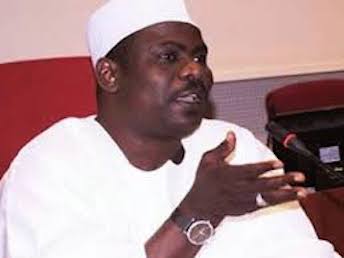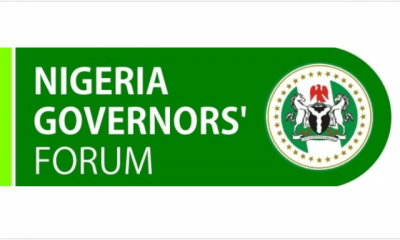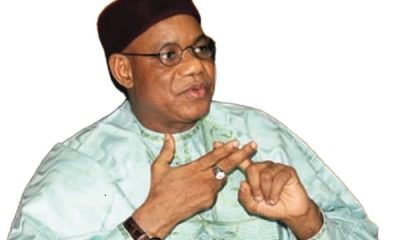Economy
Ndume Faults VAT Increase, Advocates Property, Communications Tax

By Mathew Dadiya, Abuja
Senator Ali Ndume has called for enactment of a property and communications tax to shovel revenue for government rather than increasing the Value Added Tax (VAT).
The former senate leader appealed to the Federal Government not to add to the suffering of the poor citizens with the proposed increase on VAT from five percent to 7.
5 percent.Senator Ndume spoke on Thursday with State House correspondents after meeting behind closed door with Vice President Yemi Osinbajo at the Presidential Villa, Abuja.
The visit to the Villa was the first after he contested for the position of Senate President in June against the Senate President, Ahmad Lawan, who was the adopted candidate of the ruling -All Progressives Congress, APC.
Ndume, who represents Borno South Senatorial District in the National Assembly, argued that the proposed VAT increase would affect the poor.
He also kicked against the proposed return of toll gates on the federal highways without putting the roads in good shape.
On the proposed return of toll gates, he said, “You see, the state of our infrastructure is of concern; there is virtually collapse in our infrastructure; if the purpose for which the toll gates will be placed will serve the objective of keeping the roads not only motorable but effective and safe, it is a welcome development.
“Like the Abuja-Kaduna road for example, where there is toll gate, you will be able to place security there and if you place these people there, you have to pay them and the resources is not readily available
“I am sure every Nigerian travelling for example, say from Lagos to Ibadan, if you say he is going to pay N100 at each point in four places, you should ensure that number one, the road is good; number two, he will be safe; he can drive without expecting anybody to come and close the road and kidnap or rob anybody.
“Then, it will make sense to me but for the toll gate to be placed just for the purpose of it, I don’t think that is what the government wants to do; Besides, I heard the minister say that they are bringing private partnership into it; and that is also good.”
Also commenting on the proposed VAT increment, Senator Ndume said,”I think that increase in VAT is going to have a spiral effect; and it is going to affect the poor more.
“It is true the government is not expanding the revenue base or the tax net that is why I am thinking that anybody that is using telephone here would want to just talk and pay for it of course, but right now, no one will say this is what he is paying for telephone.
“If the network provider says it is one minute remaining, you start looking for any recharge card but if you are taxed on that, you won’t say you won’t talk again because you are taxed.
“But if you add tax now, the effect will be on everybody and every commodity. Even transportation from one point to another will increase and who is going to pay or who is going to feel it more; it is the poor.
“So that is why I am saying that we should introduce Communications Service Tax and people will pay for it sometimes even not knowing and government will be able to generate more from that angle; you know the money the service providers are making out of communications.
“So, that is why I sponsored that Bill last time but it didn’t see the light of the day because of time and of course service providers opposed that.
“Let me add one thing. Yes, we have a government; the tax should be paid by those who can; who should or who can afford that tax. Like in Abuja, you see so much property; if you value them, property tax is not being paid and I am not paying too simply because nobody is paying; nobody asked me to pay.
“In Nigeria, for example, the resources is in the hands of few people; why not tax these few people instead of going to tax the poor man that is trying to survive.
“So, this is my position and I think this Communications Service Tax is part of it; ask those that can afford telephone, 60 million of them; why do you tax 200 million people? Tax the 60 million people that can afford it and you get what you want.”
Senator Ndume said that he was working on a bill to be presented to the senate known as,” Property Tax Bill”.
According to him, “I am going to do that; I am working on it; I am working on property tax bill. Not only that, I am working on another bill…maybe it will not see the light of the day; people are having what they can’t explain if they should be asked. The burden of proof should be on that person.
“If I have a mansion and my income as a senator is not commensurate with that, if you want to fight corruption, you put the burden on me to prove where I got that money.
“In Britain nowadays, it is called Unexplained Wealth Order(UWO), I am working that too; that if you own a car, you explain how you got it; because of that if you don’t know where to go with what you steal that doesn’t belong to you, you don’t even start.”
On why he was at the State House, he said, ” I am here to see the Vice President. I come from time to time; I have a relationship, very personal with the Vice President; just like the President too.
“More especially, I come to brief him from time to time on the humanitarian crisis that we are facing because the Vice President is personally passionate about it. You know what he did for us; he has an orphanage that is running very effectively in my area; accommodating over 2000 orphans.
“So, I normally come to discuss with him; he is always very curious about what is going on; so I came to adequately brief him; and of course, you know, in the course of that kind of discussion, you discuss other things which are private and personal.”
Economy
SEC Advocates Advanced Financial Inclusion by 2030

By Tony Obiechina, Abuja
The Securities and Exchange Commission (SEC) has stressed the need for Nigeria to harness its demographic dividend to advance financial inclusion through investments by 2030 for national survival or face deepening inequality.
The Director-General of the SEC, Dr Emomotimi Agama said this at the United Capital Asset Management Investment forum on Wednesday in Lagos.
Agama, in his keynote address titled: “Advancing Financial Inclusion through Investments: Bridging
Nigeria’s Knowledge and Wealth Gap,” said Nigeria must harness its demographic dividend to boost investment.
“Our theme, Advancing Financial Inclusion through Investments, is not aspirational; it is foundational to national survival.
“We stand at a pivotal moment. By 2030, Nigeria can either harness its demographic dividend or face deepening inequality. The knowledge-wealth gap is not merely an economic challenge; it is a moral imperative,” Agama said.
He said the term inclusion should be reframed as active financial involvement, where access meets empowerment, and capital becomes a tool for transformation.
Agama said that closing the financial inclusion gender gap could lift 700,000 Nigerians from poverty.
He said, “Nigeria has a great population yet we have a tiny drop of this number of persons involved in the capital market.
“That one reason for poverty, because we are running from money. We have to do something. Our market capitalisation is an opportunity to do something,
We all have
“We need to change the narrative and move the market forward. We must reach out to make the difference. We are committed to protecting investors and developing the market. Our goal is to do the right thing no matter whose ox is gored. We will work by the principles of fairness and equity to change the market. We will provide a fair ground for everyone to aspire.
He noted that MTN Nigeria’s share offering drew 150,000 new investors – 75 per cent women, 85 per cent under 40.
Agama recommended a four-pillar strategy for bridging the gaps.
He listed the four-pillar strategy as democratisation of financial knowledge, catalyse MSME Investment Channels, blended Finance Vehicles: Partner with Bank of Industry (BOI) to de-risk loans for women-led SMEs.
“We need to educate people about finances. As we drive this market, we do so for a purpose, I enjoin everyone to be the disciple and the apostles. Getting this market to move is a deliberate action,” he added.
| ReplyReply allForwardAdd reaction |
Economy
NPA Assures of Over N1.27trn Revenue in 2025

By Ubong Ukpong, Abuja
The Nigerian Ports Authority (NPA) on Monday assured that it would take into the coffers massive revenue of over N1.27 trillion in 2025, representing a 40 percent increase from the N894.86 billion it realized in 2024.
This ambitious target, the Authority said, was anchored on sweeping modernization efforts, the full activation of the Dangote Refinery’s marine operations, and the deployment of cutting-edge technology to enhance port efficiency.
Managing Director of the NPA, Abubakar Dantsoho, disclosed this in a presentation during his agency’s budget defence session wih the House of Representatives Committee on Ports and Harbours, where he defended the agency’s 2025 budget estimates and provided insights into its 2024 performance.
“Our 2025 budget proposal is more than figures, it reflects our aspirations for a more efficient, globally competitive port system,” Dantsoho told lawmakers, adding that over 70% of the proposed expenditure will go into capital projects.
For 2024, the Authority surpassed its revenue target of N865.39 billion, posting an actual realization of N894.86 billion.
However, Dantsoho revealed that only N417.86 billion, less than half of the approved N850.92 billion expenditure, had been spent as of the time of reporting.
Despite this, NPA made a record contribution of N400.8 billion to the Consolidated Revenue Fund (CRF) in 2024, nearly double the N213.23 billion remitted in 2023. Of this amount, a staggering N344.7 billion was deducted at source.
“This shows our unwavering commitment to national revenue generation, even when our own operational liquidity is affected,” the NPA boss stressed.
Dantsoho said the projected revenue increase is premised on several key assumptions and developments, including: The full operation of the Dangote Refinery, which alone is expected to draw in over 600 vessels annually through its Single Point Mooring (SPM) system; the commissioning of upgraded terminals at WACT and OMT, which will enhance container traffic; the implementation of automation tools such as the National Single Window, Port Community System (PCS), and Vessel Traffic Management System (VTMS); and increased cargo volumes stemming from global disruptions, including the Russia-Ukraine conflict, which has affected global trade routes.
He said the 2025 revenue is expected to come from the following key sources: Ship Dues, N544.06 billion; Cargo Dues, N413.06 billion; Concession Fees, N249.69 billion; and Administrative Revenue, N73.07 billion
Of the proposed N1.14 trillion total expenditure for 2025, N778.46 billion is earmarked for capital projects.
This investment, he said, will target the revitalization of critical infrastructure, including the Calabar, Warri, and Burutu ports and channels, and enhance towage services, channel depth, and compliance with international security conventions.
“Investments in infrastructure and technology are non-negotiable if we are to stay competitive regionally and globally,” Dantsoho emphasized.
He cited increasing competition from neighboring ports and aging assets across Nigeria’s coastal corridors.
The NPA also intends to address technology gaps by upgrading legacy systems and bolstering cybersecurity, ensuring Nigerian ports meet global standards for digital operations.
“We can say that with timely access to internally generated revenue and capital funds NPA would deliver the kind of impact Nigeria expects,” he said.
Chairman of the Committee, Hon. Nnolim Nnaji, urged the NPA to ramp up performance, improve port infrastructure, and play a greater role in addressing Nigeria’s revenue and unemployment challenges.
Nnaji said the ports remain a critical pillar of Nigeria’s economy, and urged the agency to meet rising expectations despite operational challenges.
“No country can thrive economically without high-performing ports. They are the economic heartbeat of every nation, determining how buoyant a country is through the flow of imports and exports,” Hon Nnaji said.
The committee praised NPA for its performance.
Nnaji stressed that the NPA’s performance has implications beyond maritime activity, noting that increased port output can significantly boost job creation across several sectors.
“The Nigerian Ports Authority is not just a revenue-generating agency, it is a national asset in terms of employment and economic impact.
“We expect to see detailed strategies on how to improve revenue generation and expand employment opportunities through your 2025 budget,” he said.
The lawmaker also pointed to growing interest in the development of new ports across the country but cautioned against neglecting existing port infrastructure.
“As we welcome investment in new ports, we must not abandon the old ones. Maintaining and upgrading our existing ports, both in the Eastern Corridor and the Western axis, is essential to long-term sustainability,” he added.
The Committee called for a clear outline from the NPA on how its 2025 financial plan will address pressing national concerns and reaffirm Nigeria’s competitiveness in regional and global maritime trade.
Economy
Senate Sets N10trn Revenue Target for NCS, Urges Agency to Curb Smuggling, Illicit Drugs

By Eze Okechukwu, Abuja
The Senate, through its Committee on Customs has set a revenue target of N10 trillion for the Nigeria Customs Service for the 2025 fiscal year, instead of the initial N6.584 trillion given to her earlier on while urging the agency to clamp down on smuggling and Illicit drugs.
The Chairman of the Committee, Senator Isah Jibrin (Kogi East), who gave the agency the marching order yesterday in Abuja during the budget defence of the revenue driving agency however commended her for exceeding its 2024 revenue target of N5.
079 trillion.The NCS team led by Deputy Comptroller General, Jibo Bello who represented the Comptroller General presented the 2024 budget performance with a revenue target of N5.
079 trillion, stressing that the proposal was exceeded by over a trillion naira.The Committee, obviously impressed by the performance commended NCS before asking them to go ahead and present the 2025 budget proposal, which the agency tied at N6.584 trillion revenue target with an expenditure of N1.132 trillion.
Following their presentation, members of the Senate Committee on Customs unanimously approved the recommendation of the revenue target of N6.584 trillion and the expenditure of N1.132 trillion for the 2025 financial year.
The Committee will subsequently present the budget proposal to the Senate at plenary most likely this week as the red chamber resumes today after a long recess tied to Eid celebration.
In his final remarks, Senator Jibrin emphasised the need for the NCS to rise up in terms of its surveillance with respect to illicit drugs and smuggling “to ensure that, as much as possible, you should be on top of your game”.
He said there are so many illicit drugs flowing all over the place, which according to him “is contributing to the issue of banditry in Nigeria because most of these guys are on drugs. What I’m saying is that, in addition to your revenue drives, you should also be mindful of some of these other functions.






















